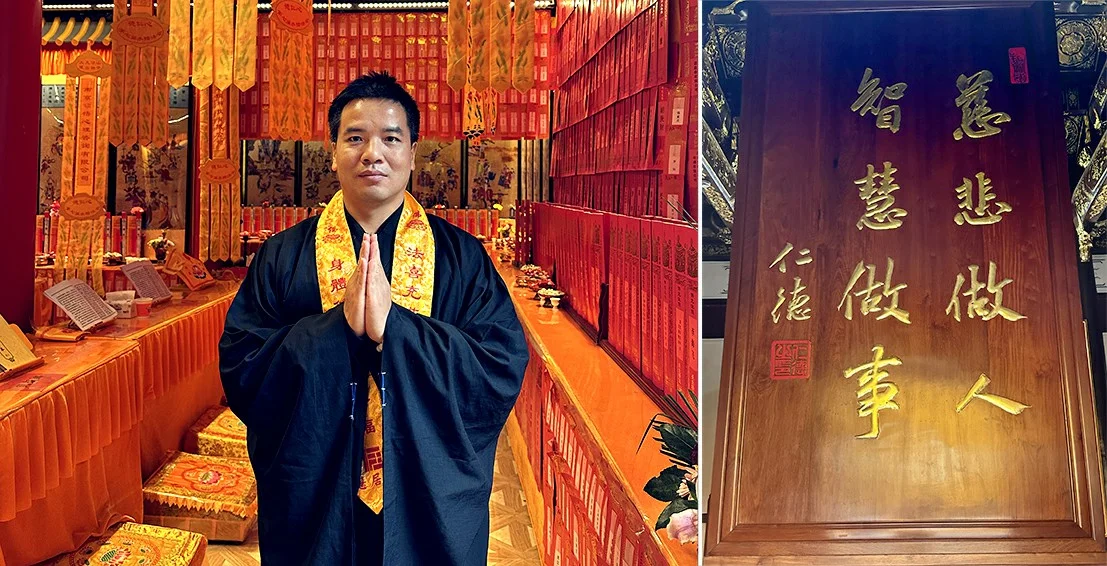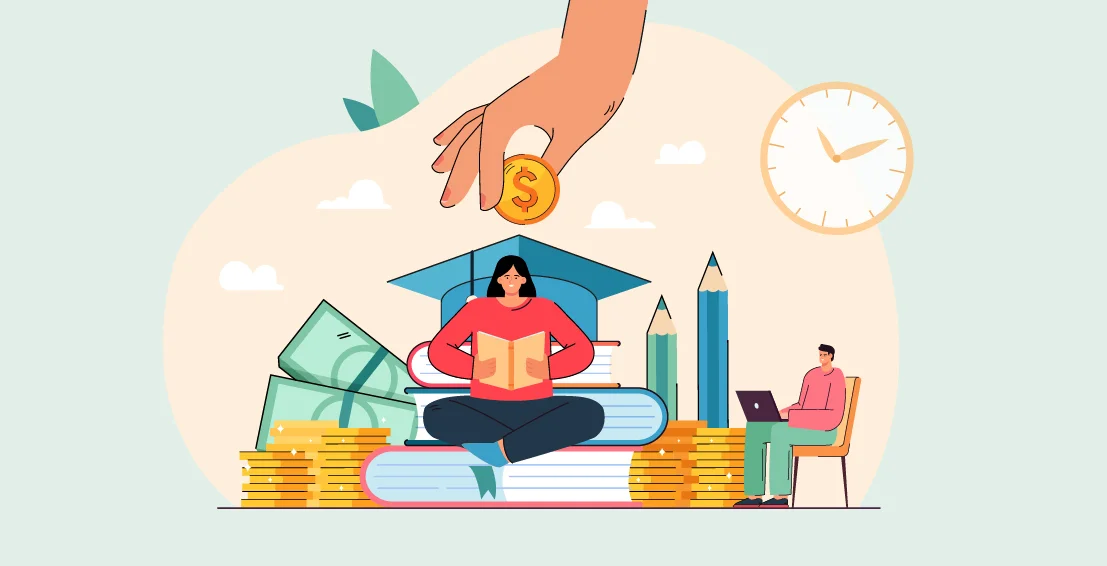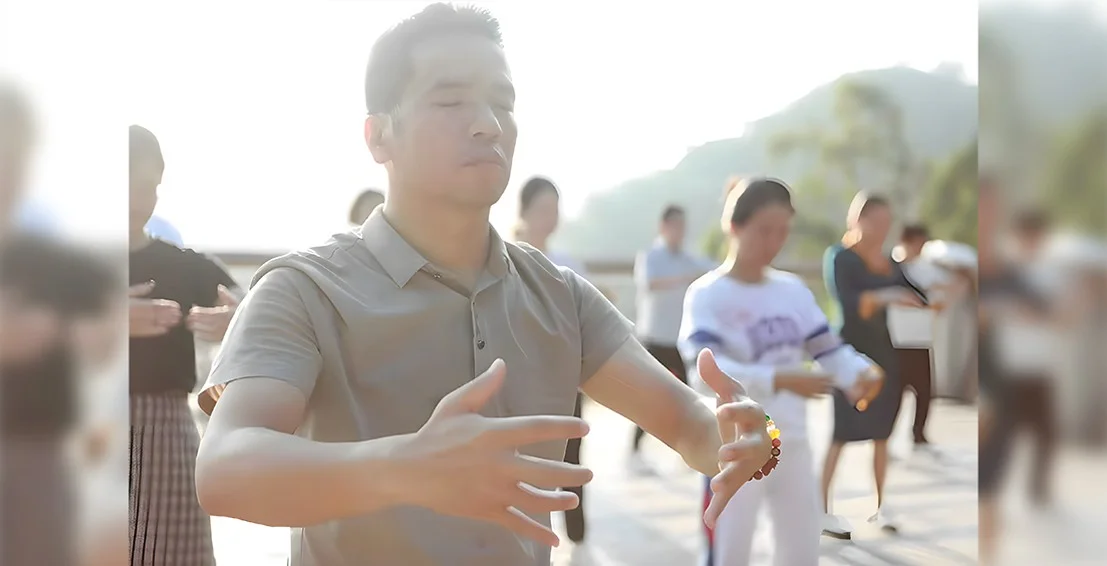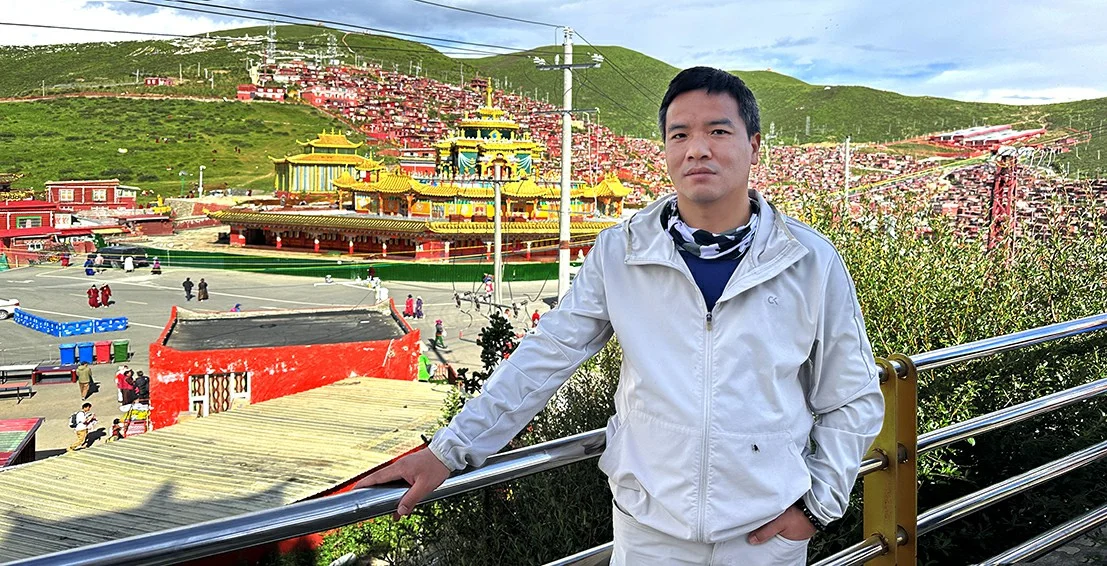Conexão Cármica da Libertação Universal e Surgimento da Bodhicitta
Conexão Cármica da Libertação Universal e Surgimento da Bodhicitta

Karmic Connection of Universal Liberation and Arise of Bodhicitta
--- Mingda's Experience at the Liberation Rite of Water and Land on Mount Jiuhua
(“Mingda" is the honorific title for Leo Chen, the CEO of TVCMALL)
In early October, I was honored to have the opportunity to participate in the Liberation Rite of Water and Land. I would like to express my gratitude to the teachers who provided me with this chance and to the organizers and benefactors who made this chance possible. Prior to this, I had no knowledge of what the Liberation Rite of Water and Land entailed. However, a compelling inner voice seemed to be calling me to participate in this event, and so I followed that inner calling, diligently sought a place, and registered for the assembly.
This ritual spanned an entire week, and if I were to summarize my experience in a few words, it would be encapsulated by the phrase "the Arise of Bodhicitta." Although I may not fully comprehend what the "Bodhicitta" entails, I cannot find a better way to describe my experience. To provide a more specific breakdown:
1. Entering the Gateway of Repentance: Enhanced Awareness and Repentance Power
In the first two days of the ritual, all participants, under the guidance of the venerable monks, collectively recited the "Liang Huang Repentance Liturgy." As we delved deeper into the recitation, I was deeply moved by the intricate correspondences between the text and the workings of karma (I marveled at the depth and precision of human wisdom). Simultaneously, a sense of awe and trepidation toward the consequences of our actions welled up within me, and I developed a genuine determination not to repeat past negative deeds. As the ritual continued, I found myself becoming more adept at quickly recognizing my thoughts and rapidly transforming negative ones, reducing the extent to which they interfered with my mind. I even noticed that my reaction time had significantly shortened. On several occasions, negative words were about to leave my mouth, only to be caught by my awareness (I was amazed by the rapid detection). During a discussion with Venerable Liao Fan, he mentioned the three levels of repentance: repentance of deeds, repentance of principles, and repentance of the mind. My understanding is that repentance of deeds relates to actions and their consequences, repentance of principles deals with understanding and correcting the underlying principles, and repentance of the mind involves a profound transformation of values and the cultivation of compassion and the Bodhicitta. This realization was akin to discovering a treasure, as it highlighted my previous superficial understanding of repentance, which had merely been theoretical knowledge.
2. Elevated Generosity in Acts of Giving
Throughout the ritual, we were influenced by the environment and chose to actively engage in acts of giving. Some of these acts were premeditated, some were spontaneous, and some were unforeseen. During this process, we gained a firsthand understanding of the impermanence of all things and witnessed how our thoughts, emotions, and behaviors fluctuated when unprepared or faced with impermanence. This experience allowed me to identify deeper roots of my attachment to "non-giving," stemming from past experiences of scarcity and a mindset rooted in the exchange of material goods, as well as an awareness of their limitations and their constraints on my true self. Subsequently, my perception of the principle of exchange underwent a transformation: I realized that exchange should not be limited to material possessions but should encompass the exchange of both material and spiritual aspects. I even considered that the concept of exchange itself may be a constraint on our freedom. As a result of these changes in perception, my generosity underwent a transformation, and I found myself less troubled by acts of giving, and even when such troubles arose, I could quickly adjust.
3. Transformation of Compassion, Reverence, and Joy
During the ritual, we engaged in daily rituals of deep respect and reverence, both in our language and actions. The Liberation Rite of Water and Land is also known as the "Grand Offering Ceremony" and is dedicated to liberating all sentient beings across multiple lifetimes. This experience deepened my understanding of the distinction between my compassion and that of Buddhas and Bodhisattvas. During the ritual, we lived with nearly a hundred monks and experienced firsthand the challenges they faced in their monastic life. I deeply admired their dedication, compassion, and joyful generosity, which served as a source of inspiration. As we performed prostrations for nearly an hour daily in the Moonbody Hall, dedicating merits to our deceased loved ones and ancestral spirits, I suddenly realized that I could extend this dedication to other sentient beings in need. After the second round of prostrations, I felt a sense of unprecedented joy and ease within. Even in moments when negative emotions and energies arose, I quickly recognized them, made the necessary adjustments, and my capacity for joy increased. I began to grasp concepts such as "rejoicing in the merits of others," which were previously abstract.
4. Embracing the Spirit of Great Vows
During discussions with fellow participants, one of them shared the great vow they had made during the ritual. This sparked an insight in me: isn't the core spirit of Ksitigarbha Bodhisattva encapsulated in "great vows"? Shouldn't I also take advantage of this opportunity and make a great vow? As the saying goes, "The mind gives rise to myriad dharmas." I was quickly inspired to make a great vow: "A hundred years of TVCMALL." The day after making the vow, I felt a sudden surge of inspiration, guiding me towards the principles and direction of fulfilling this great vow. I deeply sensed the transformative power of great vows, which seemed to be infused with the energy and wisdom of the Bodhisattvas.
5. A Deeper Understanding of Buddhist Prostrations
During the week-long ritual, I prostrated more times than I had in the past twenty to thirty years (I had rarely prostrated before). With repeated prostrations, I had an epiphany: the true practice in prostrating to the Buddha is the cultivation of reverence, compassion, generosity, joy, tranquility of the mind, and more—rather than mere superstition. This realization liberated me from certain reservations about prostrations and allowed me to focus on inner transformation. After the ritual, I even dedicated a day to visiting around ten temples on Mount Jiuhua, encountering numerous Buddha statues. Seeing so many Buddha images, I realized that they naturally evoked feelings of joy, reverence, compassion, and a yearning for the beautiful. I also began to appreciate the cultural and artistic heritage passed down by our ancestors through countless generations. I had a newfound sense of insight when I read the inscriptions and signs within the temples. For instance: "Diligence in cultivating the Way," "Knowing suffering and breaking free from the cycle of birth and death," "Vows of great depth," "Residing in great compassion," "Endless fulfillment of vows," "Perfect awakening," and "Limitless rejoicing."
6. Life Is Inherently Challenging, but Through Patience, There Is Sweetness
The most challenging part of the ritual for me was on the second day when we had to wake up at 2 a.m. Over the years, I had woken up at four or five in the morning, but I had never woken up at 2 a.m. On that day, I persisted until five or six in the morning, experiencing severe backache and unbearable pain. The final day was also challenging, and I longed for the ritual to end quickly. During the process, my accustomed fast-paced lifestyle in Shenzhen made it difficult to endure some stages of the ritual, where the venerable monks recited at a slower pace. Fortunately, I persevered. It was through these challenges that I experienced significant personal transformation, which is difficult to describe fully in words. This transformation was what I needed and longed for, and it cannot be acquired instantaneously with wealth. I later sought guidance from Venerable Liao Fan, inquiring about the concept of "unborn patience." He inspired me by explaining that ordinary patience involves bodily discomfort, while Dharma patience is free from bodily discomfort, and "unborn Dharma patience" means being unshaken even in the face of the principles of birth and death. Although I haven't fully grasped this concept, it left me with a profound sense of enlightenment, as the monks often say: Arising the Bodhicitta is challenging, and protecting it is even more challenging.
In conclusion, I would like to express my gratitude to all the teachers, friends, fellow participants, and the support team who facilitated this extraordinary opportunity and contributed to its success. In Buddhism, it is said that three things are difficult to attain: a precious human life, genuine teachings, and the favorable conditions to practice them. Without the blessings of this grand environment, personal awakening and achievement are ultimately limited. I wish for everyone to realize their aspirations, to attain both happiness and wisdom, and to find success in all their endeavors, embracing boundless joy.
Deixe um Comentário
O seu endereço de e-mail não será publicado. Os campos obrigatórios estão marcados com *
Mantenha-se Atualizado com o Atacado TVCMALL
Inscreva-se gratuitamente no nosso blog e receba conselhos especializados, informações do setor e as melhores escolhas de atacado. Aumente suas vendas com a TVCMALL hoje!



